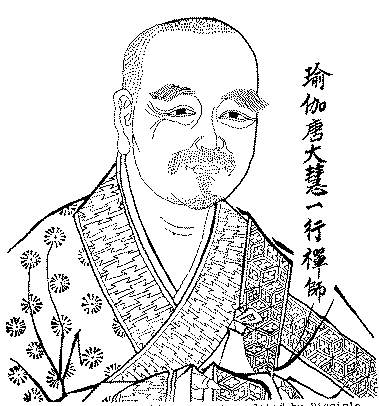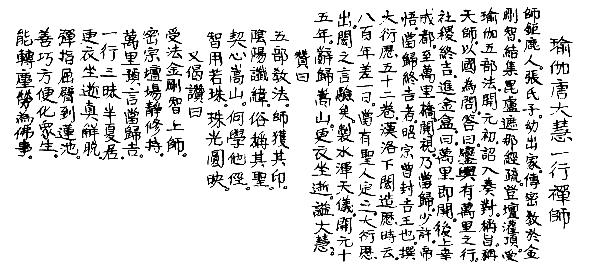Bodhi Seal of the Patriarchs
T’ang Dynasty Master Ta Hui I Hsing of Yogacara School
--Written
by the Venerable High Master Hua
--Translated
by Disciple Bhiksuni Heng Yin

The Master was a native of Chu Lu1 and his layname was Chang. He left home when young, received the transmission of the secret teaching from Vajramati, and compiled a commentary on the Vairocana Sutra.2 He ascended the platform to be initiated and received the five-division Yogacara dharma.3
In the first year of the K'ai Yuan reign (A. D. 713) he had a highly successful audience with the Emperor, who questioned him about the future of the country. The Master answered, "The Imperial Chariot will travel 10,000 miles and the nation will ultimately be fortunate.
He further handed the Emperor a small gold box saying, "Open it after 10,000 miles." The Emperor gave him the name "Master of the Gods" on this occasion.
Later, the Emperor was forced to flee to Chengtu,4 and when he arrived at the "Ten Thousand Mile Bridge," he opened the box and saw a small measure of "Proper Return"5 medicine. The Emperor understood that he should return to give the throne to the Fortunate King.6 Emperor Chao Tsung ascended the throne and became known as the "Fortunate King."
The Master compiled the Ta Yen calendar in fifty rolls. Earlier, in the Han dynasty, Lo Hsia Hung had made a calendar and predicted, "After eight hundred years less one day, a sage will revise the calendar." The Ta Yen Calendar verified his prediction. The Master also composed the Shui Hun T'ien Manual.7
In the fifteenth year of the K'ai Yuan reign (A.D. 728) he took leave and returned to Sung Mountain where he dressed, sat down, and left the world. He was given the posthumous title Ta Hui, "Great Wisdom." A verse in his praise says,
The Master obtained the seal
Of five-division teaching dharmas.
The yin-yang prophecy verified,
The common folk called him a sage.
At Mount Sung his mind meshed8
What need of further study?
Like gems his wisdom and actions were,
Gems perfect, brilliant, and bright.
The Venerable Master Hua'S verse in praise of him says,
He received the Dharma from Master Vajramati,
Went before the secret altar to quietly hold and cultivate;
For half the summer retreat-Single Conduct9 sat in samadhi;
Ten thousand miles, a prophecy, the return was fortunate.
He dressed himself, sat down and died—so truly was he free!
In a flick of the wrist or a finger-snap he arrived at the lotus pool.
He converted living beings with skill and expediency,
Transforming
into the Buddha’s work the weariness of the world.
*************************************************************************
1Shantung
2T.848
3In commenting on this passage, the Venerable Master Hua
said, "This may be interpreted as the five major Sutras of the
Yogacara School, or as the five directional divisions, i.e. East, the
Vajra Division (for subduing demons); South, the Jeweled Birth division;
Center, the Buddha division; North, the Chieh Mo division; West, the Lotus
division. These five control the demon hoards of the five directions and
prevent them from breaking into the world. The Surangama Mantra is divided
into five parts, which represent the five divisions, and each division
within the mantra also contains all five divisions. If one knows the
dharmas of the five divisions, he can use the Vajra division when it is
called for, or the Lotus Division at the appropriate time, etc. Thus, the
Surangama Mantra is extremely wonderful."
4in Szechwan. T'ang Emperor Hsuan Tsung was forced to flee when An
Lu Shan seized Ch'ang An, the capital city, in the rebellion of 755.
5This medicine is good for circulation. When the Emperor arrived at
the Ten Thousand Mile Bridge, he remembered Master I Hsing's words,
"Open after 10,000 miles," and opened the box. Seeing the
medicine, the Emperor knew it was "proper" for him to
"circulate" back, to return.
6another name for T'ang Emperor Chao Tsung. hence Master I Hsing's
comment, "and the nation ultimately will be fortunate."
7Both works deal with the principle of Yin and Yang. See line four
of the first verse.
8and united with the mind seal of all Buddhas which had been
transmitted by Bodhidharma.
9 the Master's name, "I Hsing."

3
In